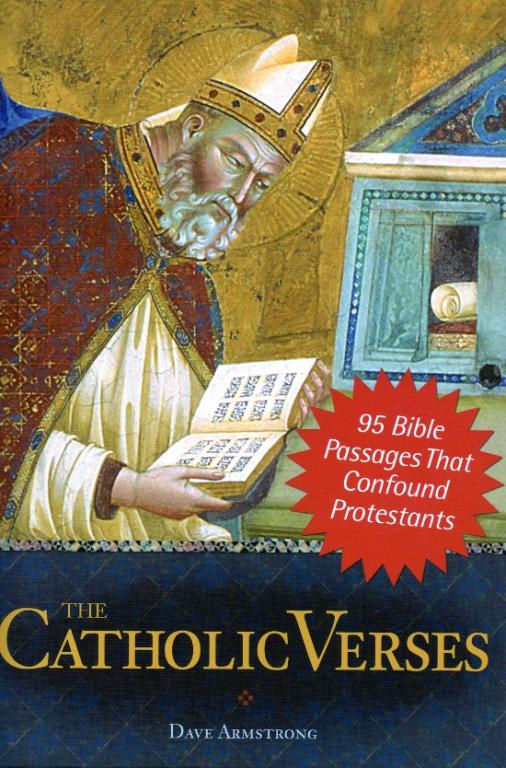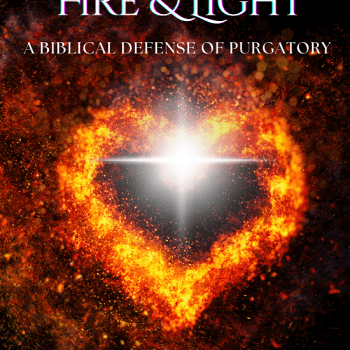
Apologetics is disliked usually because of personal inability, or observing others doing it badly.
A Catholic wrote on the Coming Home Network [“CHNI”] discussion board where I moderate [a job I had from 2007-2010], that apologetics was “useless” and that it consisted of “people arguing their little points always taken out of context.” She proclaimed loudly that she had “no use for apologetics” and that “arguing little points settles nothing and only further polarizes.”
Well, as you can imagine, that didn’t sit well with me, so I had a bit to say about it!:
* * * * *
Most people (at least those who are here) see the self-evident value of apologetics. When someone blasts apologetics altogether, then I must speak up and show the unreasonableness of this position, especially in a forum where so many people are here in the first place because of the apologetics constantly exhibited on The Journey Home and in written conversion testimonies and the largely apologetic writings that CHNI sells precisely in order to help new and prospective converts. CHNI is essentially an apologetic enterprise (which was a big reason, I think, why I was hired).
CHNI is also quite “pastoral” and a support system on a basic human level of understanding and empathy, but apologetics works hand in hand with that. It has to, because people who are considering converting ask tons of questions (usually quite good ones) and some sort of answer has to be provided, and there is your apologetics.
You can tell a person what Catholics believe, which is catechesis, but as soon as they ask, “why do you believe that?” or “how can that belief be squared with the Bible?” and so forth, then you are in the realm of apologetics, whether you want to be or not, and whether you personally “like” apologetics or not. It won’t be sufficient to merely say, “believe it and take it on faith and don’t ask questions. Shut down your mind, because this is a faith question, not a rational consideration.” That does no one any good. That’s no better than being in a mind-control cult.
St. Paul certainly liked apologetics, since he is often described as “arguing” and “reasoning” with and “persuading” and “dialoguing” with both Jews and Greeks, and we see him most definitely doing apologetics (in a very clever and useful way) at Mars Hill in Athens (Acts 17).
A major reason people who don’t like apologetics do so, in my opinion, from long observation, is either because they are no good at it themselves (some people frown upon what they are unable to do) or because they observe other people doing it badly, and they throw the baby out with the bathwater. It’s a very common emotional response to many things: the equation of a thing with its corruption or poorly understood manifestations of same.
And so apologetics is often equated with useless quarreling and wrangling (because many indeed who claim the mantle of “apologetics” on the Internet unfortunately too often do little more than that), which approach is indeed condemned repeatedly by St. Paul.
But that isn’t what apologetics is, anymore than a calm, constructive father-to-son or mother-to-daughter discussion is to be equated with a family spat or true quarrel, filled with accusations and insults and yelling and (as the case may be) cussing.
Another, less hostile person wrote: “I think authors/apologists tend to lose credibility when they are constantly criticizing other denominations. It sort of goes against the teachings of Christ.”
Not at all (as to the latter assertion). I fully agree that folks should emphasize a positive, proactive message, but on the other hand, the Bible is filled with denunciations of false teaching. Jesus’ most “negative” utterances were directed against the Pharisees. He even called them “vipers” and “whitewashed tombs” and “the blind leading the blind.” St. Paul goes on and on about various errors and names people like “Alexander the Coppersmith” who had opposed him. I could give innumerable examples. He is constantly correcting false teaching, and states, for example:
2 Timothy 4:3-4 (RSV) For the time is coming when people will not endure sound teaching, but having itching ears they will accumulate for themselves teachers to suit their own likings, and will turn away from listening to truth and wander into myths.
St. Peter opposed false teachings as soon as he started preaching after Pentecost. He opposed Ananias and Sapphira, accused them of lying to the Holy Spirit, and in fact they were both judged and struck dead by God (Acts 5:2-11). This is arguably the first “anathema.” He rebuked Simon for trying to buy the power of the Holy Spirit (Acts 8:14-24): what is now known as “simony”. The Apostle John is thought to be often opposing the Gnostics in his Gospel (as many commentaries note).
The Church Fathers continued this practice. They were always opposing false doctrines and heresies and sects. St. Augustine, the greatest father of all, wrote tons against the Donatists and Manichaeans (his own former group) and the Pelagians. Athanasius wrote against the Arians, etc., etc. They condemned the errors and then appealed to the Catholic Church as the truth because its doctrines had been passed down and preserved without corruption.
The Council of Trent (like all ecumenical councils) was largely devoted to correcting errors (that is, criticizing others). It had to do this, because it was condemning the falsehoods that Protestantism had brought in. The Council of Ephesus in 431 condemned Nestorianism; Chalcedon in 451 took on Monophysitism, etc. The Council of Nicaea anathematized Arianism.
It’s always been this way and always will be. A large part of the task of an apologist like myself is to correct errors as well as defend the truth (in fact, this is largely part of my specifically delegated task as a staff member of CHNI; I’m a sort of “doctrinal watchdog”). They are really two sides of the same coin. One tries to do it in as nice and non-personal way as possible, but many people are bound to be offended when they are told that they are wrong, by the standard of the Church and the Bible and apostolic tradition, etc.
But aren’t we “judging others” when we say they’re wrong? Is that not a lack of love (so the objection goes)? No we’re not “judging” in that bad sense of the word (i.e., hypocritically or uncharitably condemning), if in fact they are in error. To correct someone and set them back on the right path is, in fact, quite a loving thing to do (as every loving, concerned parent who disciplines their child understands full well).
Of course we are to exercise Christian, unconditional love. Part of that love is to rebuke someone in love, for their good, not to harm or belittle them. Love is not always touchy-feely, warm fuzzies, peaches and cream. It’s not just us, personally, who are right, but the Church, which is larger than we are.
I do agree, though, that there are a not insignificant number of apologists (real or imagined) who have a problem with tone (though the problem is often overstated or exaggerated). With the Internet, many people call themselves “apologists” but have insufficient background to do so, and give others a bad name (I had been a Catholic over six years, and published in books and several magazines and had even written my first book before I ever had a website at all).
Believe me, I know of this problem, because I often have to receive a brunt of criticism because of baggage people have, in reacting to others doing apologetics in a poor way, setting a bad example (one becomes a sort of scapegoat, I suppose). So I’m quite aware of it, and I have advised folks many times to tone it down, when I thought they were doing apologetics badly.
And others have told me to “tone it down”, too, when the occasion warranted it, as I am not perfect, and with the large volume of words that I write and number of people and different belief-systems I interact with, it is very difficult to be perfect in tone, charity, and speech (thus I have issued many public apologies when I thought I blew it). Who ever does a perfect job? We all fall often in matters of control of the tongue.
But, that said, one can know if he has enough patience and knowledge, by and large, to deal with “difficult” individuals in such debate, and those who differ, or whether to wisely refrain from doing so.
Anyway, I want to emphasize that both things are important, and are harmonious with each other:
1) We need to exercise the love of Christ and express ourselves gently and charitably.
and:
2) At times, we need to correct doctrinal or ethical error (bishops and priests and teachers and catechists and apologists all the more so), and do it in the spirit of #1. This is not contrary to #1 at all, and in fact, is an aspect of it, as error never did anyone any good. If we can’t do #2 with the spirit of #1, then we shouldn’t do it at all, in many cases, and should ask someone more charitable to do it, so as to avoid hypocrisy and possibly scandal.
I was asked if everyone is “called to be an apologist.” Obviously not all are called to apologetics as a vocation or occupation, as I have been. I think, though, that in some way every Christian should at least have a rudimentary understanding of why they believe what they believe, in order to bear witness to others if asked. That can be obtained by reading just one or two good apologetic books. This is the bare minimum, in my opinion. Reading a book or two or hearing some lectures or attending one apologetic conference certainly won’t put anyone out.
On the other hand, not everyone can become an expert on everything. That’s why people specialize and become theology professors or priests or nuns or catechists or lay apologists (or a church musician or eucharistic minister, etc.). Different parts of the Body . . .: that’s how God designed it, “each with his own gift.” Whatever gift God gives us, we ought to put to good use: whether we are in the medical profession or an engineer or janitor or baker or waitress; whatever it is: whether exalted in this world or looked down upon.
And I say the work of the mother and housewife is the most important work of all in this world; I always contend that what my wife does as a homeschooling mom is more important than what I do. All work is honorable and no one should feel any shame, but all should use their God-given abilities as best they can.
St. Paul changed his method according to his hearers (1 Cor 9:19-23). Hence on Mars Hill in Athens: the intellectual center of the world at that time, he spoke in a way we don’t see him speak anywhere else. He quotes pagan Greek poets and philosophers, talks about Greek idols, and makes an analogical philosophical argument.
In approaching issues of basic apologetics, we all have to accept the word of scholars at some point. A few books read along these lines will help our faith and our confidence in the objective facts of Christianity, and aid us in gaining more confidence. But everyone who seeks to do apologetics should be thoroughly prepared. I always tell people not to get too zealous without adequately studying up first.
Having a desire to get to the place of what might be called “apologetic confidence” is already three-quarters of the battle. So many people care little about the things of God and theology, let alone about sharing it with anyone else in a cogent fashion. If someone has the desire, they’ll get there in due course. All they have to do is read on some basic topics. And there is plenty online that can be read for free now. All of Chesterton’s apologetic books are available, etc.
Someone recounted their experience in sparring with an atheist professor: “I posted links for said [NT documentary] evidence, [but] I was laughed to scorn since I could not provide it myself. He claimed there was more evidence to the contrary, including archaeological.”
No one is required to know everything on the spot. Most people are not Bible scholars or professional apologists. Providing a link is no more laughable than a scholar recommending a book in a footnote. This atheist was acting like an arrogant ass, in my opinion. He needs to be challenged to produce this “evidence” he refers to, by all means. Most of these types of guys know very little about the Bible. I’ve always marveled at this.
I’ll be debating some professor of philosophy, and he fancies himself an expert on Scripture. But now he is on my turf, the area I’ve studied for over 30 years now, and it doesn’t go well for him when I point out some basic things that he is ignorant of (I have many such debates on my site. I’m not exaggerating at all).
Knowledge and scholarly attainment in one area doesn’t automatically transfer into another. It’s not that I have all the answers, at all (I certainly don’t): in these cases it is so often the sheer ignorance of the atheist in biblical and theological matters that makes them easy to refute. I have many papers about this. I’ve seen it again and again.
They think they know so much about the Bible and Christianity, but almost invariably it turns out that they really don’t, and it is only bluster to intimidate the Christian, and intellectual arrogance. And if you dare to critique their “deconversion” stories, as I have, to show that the reasons why they forsook Christianity fall short, to say the least, they go spastic. One such case was John Loftus, who runs the blog, Debunking Christianity, and has a book out that is selling decently for its type.
These same supposedly oh-so-smart people will deny, for example, that Jesus ever existed: a perfectly ridiculous thing to believe. Mainly, I’m trying to get across that we Christians (of whatever stripe) need not be so intimidated by these folks. They can be effectively answered more easily than is thought.
***
(originally 1-27-08)
***













